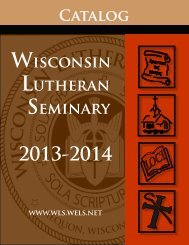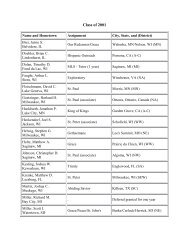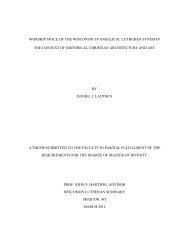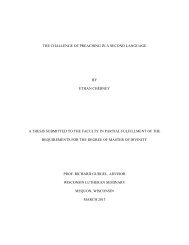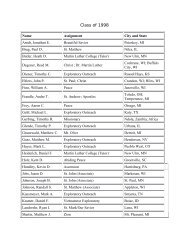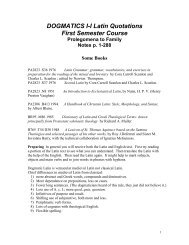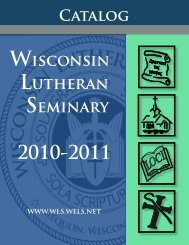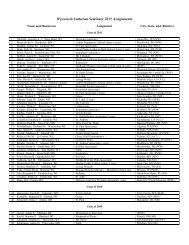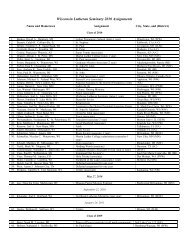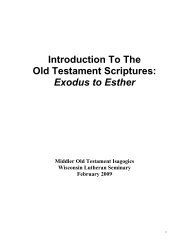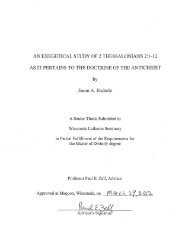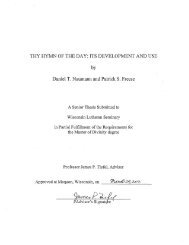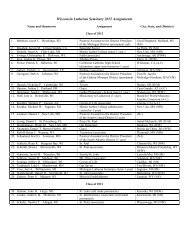Untitled - Wisconsin Lutheran Seminary - WELS
Untitled - Wisconsin Lutheran Seminary - WELS
Untitled - Wisconsin Lutheran Seminary - WELS
Create successful ePaper yourself
Turn your PDF publications into a flip-book with our unique Google optimized e-Paper software.
our distance is whether in the present passage Paul expected this to happen yet another time, or<br />
whether he was simply using well-known ‘anti-Christ’ events to describe the Rebel’s selfdeification.”<br />
49<br />
Some commentators and exegetes take the word out of its context. They remove the<br />
word from the broader context of this section in which Paul speaks of the revelation of the “man<br />
of lawlessness” in futuristic terminology. Wanamaker boldly says:<br />
2 Thes. 2:3f., however, reads like prophecy about historical events to come, and it is<br />
almost certain that this is how Paul and his readers would have understood it. The<br />
passage can no longer be understood as valid, since the temple was destroyed in AD 70<br />
without the manifestation of the person of lawlessness or the return of Christ occurring.<br />
In order to maintain the continuing validity of the passage, some deny the obvious<br />
reference to the historical temple at Jerusalem. 50<br />
Scripture, however, is not to be discarded as unimportant or as no longer applicable. God has<br />
preserved this letter of Paul as his inspired word. The comfort and warnings Paul gave to the<br />
Thessalonian Christians are words of comfort and warning to all generations as well.<br />
Some have taken the word out of the context of this very passage. With the phrase ἐπὶ<br />
πάντα λεγόμενον θεὸν ἢ σέβασμα (“over everything that is called God or object of worship”) Paul<br />
does not limit the Antichrist’s usurpation of authority to the Christian or Jewish faith. Lenski<br />
says,<br />
By saying “everyone called God,” etc., the Antichrist’s lawlessness is described as being<br />
worse than that of the worst pagans. Pharaohs and Roman emperors were deified and<br />
claimed divine honors, but never for one moment did they do this “against” any of their<br />
pagan gods, temples, altars, etc. Antiochus desecrated the Jewish Temple, but he did it<br />
by erecting an altar to Zeus. About thirteen years before the writing of this epistle<br />
Caligula, the Roman emperor, did the same by trying to have his own statue erected in<br />
the Jewish Temple, but even he was in no way opposing and exalting himself against the<br />
Roman gods and objects of worship. 51<br />
49 Gordon D. Fee, The First and Second Letters to the Thessalonians (Grand Rapids, MI: Wm. B.<br />
Eerdmans Publishing Co., 2009), 284.<br />
50 Charles A. Wanamaker, The Epistles to the Thessalonians: A Commentary on the Greek Text (Grand<br />
Rapids, MI: Wm. B. Eerdmans Publishing Co., 1990), 248.<br />
51 R.C.H. Lenski, The Interpretation of St. Paul’s Epistles to the Colossians, to the Thessalonians, to<br />
Timothy, to Titus and to Philemon (Minneapolis, MN: The Wartburg Press, 1946), 409.<br />
26



